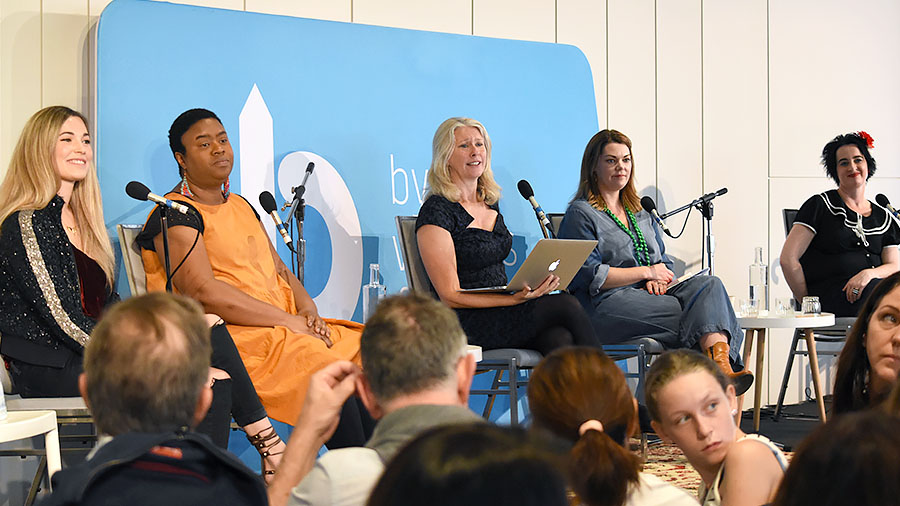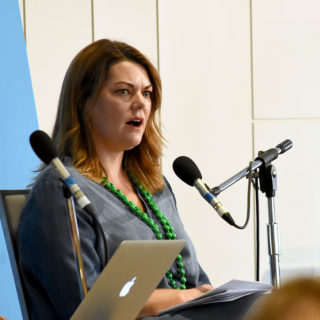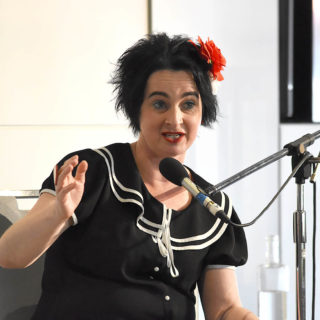What to do about the trolls?

Journalist Ginger Gorman has been infiltrating the world of trolls, those not-so-fantastic disruptors of the internet.
After being mercilessly hounded by them on social media, Gorman felt the need to know – for the sake of all of us – how these abusive, inflammatory, aggressive and usually anonymous people think, and what makes them tick.
The outcome of her research is found in her book, Troll Hunting.
Gorman was on a Sunday morning panel that featured a cast of stellar women including Julia Shaw, Maxine Beneba Clarke and Greens Senator Sarah Hanson-Young, and was chaired by journalist Tracey Spicer.
There is a ‘spectrum’ of trolling, Gorman says, with the harmless yet classic ‘Rick Roll’ on one end, and the criminal ‘predator trolls who seek to cause psychological harm’ on the other.
This session focused squarely on the latter.
Beneba Clarke kicked off the talk by reminding us that trolling has origins that stretch back into the past.
‘I grew up in the pre-twitter era. I’m used to being trolled in real life,’ the Growing up African in Australia author said.
But Beneba Clarke is now also used to the online brand of prejudice, and highlights how there is a trade off between the increased representation of minorities and their privacy as individuals in their personal lives.
‘The more you pop your head up above the barricade, the more you get shot at.’
Greens senator, Hanson-Young empathised with this, and pointed out that, apart from being a woman, Beneba Clarke has to put up with the ‘extra attack due to the colour of [her] skin’.

Hanson-Young is the youngest woman to be elected to the Australian Parliament: ‘I was 25, naive but feisty… a single mum… pro-gay marriage… but more than that, I had an opinion.’
This has made her a target for trolls, online and in parliament.
‘We have more access to constituents than ever before… but there is a darker side to it… When trolling becomes abusive it undermines your message.’
She regularly feels the double-edged sword of this.
Hanson-Young wrote about her experiences of ‘slut-shaming’ in federal parliament, largely by former Liberal Democratic senator David Leyonhjelm, and in social media in En Garde.
Hanson-Young provided the first example of internet trolling for the session, by quoting one social media post attributed to Leyonhjelm: ‘25 percent of woman are on meds for mental illness… That means 75 percent are running around un-medicated.’
Is this a harmless internet troll?
If yes, then what about receiving death threats once per week?
What about a rape threat levelled at your daughter?
Hanson-Young quoted from an anonymous threat she received: ‘If you don’t shut up, we’ll rape your daughter.’
There are those who downplay the seriousness of such trolling: ‘Oh, but it was probably just some lonely kid living in his mother’s basement.’
Hanson-Young demanded that threat be properly investigated, and the findings were that the culprit was a police officer from New South Wales.
Unfortunately, death threats to us and those close to us are that uncommon. Ginger Gorman later told the audience how such threats came to her: ‘When my kids were threatened, it was one of the most terrifying moments of my life.’
But how do we deal with these people?
Shaw said that her book, Making Evil: The Science Behind Humanity’s Dark Side is essentially about how we are all capable of evil, and that, indeed, the term ‘evil’ itself can be used to ‘dehumanise others’.
Shaw also made a ‘call for empathy’ as she argues not to ‘dehumanise those who dehumanise others’.

In order to understand internet troll behaviour, Shaw cited Routine Activity Theory, a criminology theory developed in the ’70s, which established that three things are needed for a crime to be committed.
- A motivated offender
- A suitable target
- Lack of capable guardians
‘The internet is lacking in number three,’ Shaw said. ‘It’s time we get our shit together on this front.’
Gorman also has news for those who think that internet trolling is just ‘white feminist woman whining’.
Gorman commissioned a national survey by the Australian Institute which revealed the annual cost to the economy from predatory internet trolling and harassment is $3.7 billion, caused in large part due to time taken off work and medical bills.
Around two out of every five internet users said they had been trolled.
Beneba Clarke said that internet trolling can stifle the motivation to produce work on social change, and often her colleagues will tell her ‘[they] can’t put work out because [they] don’t want to deal with the backlash’.
Throughout the session, the panel discussed many factors that are said to contribute to internet trolling: lack of parenting, racism, rhetoric from prominent media officials and politicians, sexism, irresponsible tech companies, lack of legislation, etc etc.
But, the underlying theme of the discussion was that humans are intelligent, and that we can do so much better when it comes to battling internet trolling.
When questions were opened up to the audience, one woman asked: ‘What happened to the police officer?’
‘He was charged and convicted,’ Hanson-Young said. ‘But I’m still waiting to hear if he’s getting paid while on leave.’
Snowy Frankland is a Southern Cross University Creative Writing student. Southern Cross University students have reported on Byron Writers Festival since 2010. Find out where a degree from Southern Cross University can take you.
